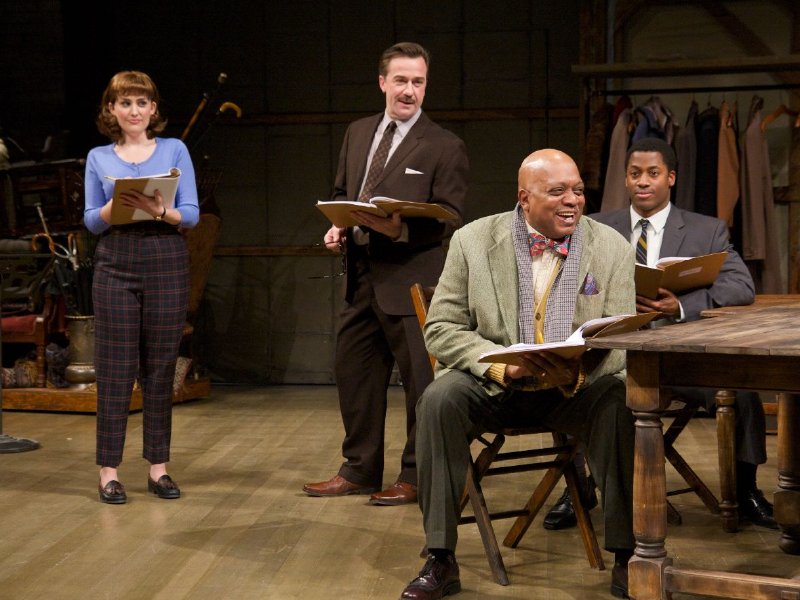This year was unlike any other in my three decades of writing about theater in Milwaukee and Wisconsin. Offstage business upstaged what happened on the stage.
That is not the goal of theater companies large and small. They want to be known for their work, not their ability to grab news headlines. But these are uncommon times, and the arts are truly struggling to survive.
The Skylight Opera Theatre's summer of tumult was the biggest stage story I have covered since the Milwaukee Rep developed its Baker Theater Complex in the late 1980s. Serious financial problems began the crisis. In a quest to save money and cut payroll, managing director Eric Dillner and the executive committee of the Skylight's board unexpectedly fired several key staff members, including highly respected artistic director Bill Theisen. The date was June 16.
Milwaukee's theater community was stunned. The affable Theisen began his professional career in the Skylight chorus as a teenager, and he is very well-liked. Within a few hours of the terminations, Facebook was ablaze with incredulity and anger as the city's performing artists and some audience members fumed and began to plot.
Internet blogs, particularly those written by Tony Clements and Jonathan West, both of whom have performed in Skylight shows, quickly took up the cause of getting Theisen his job back. Street demonstrations, more firings and mass resignations of artists scheduled to appear in the 2009-10 season followed. Several unflattering stories about the situation appeared in The New York Times.
Dillner and the board dug in their heels, and a bitterly toxic cloud hung over the Broadway Theatre Center, the Skylight's home. The company's approaching season, its 50th, appeared to be in deep jeopardy.
The fever finally broke nearly two months later when Dillner resigned. Former Skylight managing directors Colin Cabot and Joan Lounsbery temporarily returned to restore order in the classroom. Theisen was rehired to be the company's artistic director through next season, and the very capable Amy S. Jensen is now in place as managing director.
Although formidable financial challenges remain, the Skylight is stable again, but the summer strife raises some broader questions that go beyond the company. Who owns a much loved arts institution with deep roots in a city? Who can unilaterally make major, personality changing alterations?
The board of directors? The people who create the art? Large financial contributors? The audience?
Drama has been absent from the significant changes the Milwaukee Rep made in its executive offices this year, but that doesn't lessen their likely impact in the next decade. The company's board clearly wants the largest theater company in the state to be less insular in its dealing with the community and more aggressive in appealing to new audiences.
We got our first hint of this in early June when the Rep chose Dawn Helsing Wolters to be its new managing director, the position responsible for running the business side of the operations. Young, enthusiastic and energetic, she has been a refreshing tonic for the company's relations with the rest of the arts community.
While it may not have always been a fair appraisal, the Rep has often been perceived as arrogant and indifferent to its local theater brethren.
That charge certainly cannot be leveled against Helsing Wolters. The company's selection in the fall of British director Mark Clements as its next artistic director pushes change further. Clements officially takes office July 1, 2010, but in the week following his October appointment, he and Helsing Wolters behaved like politicians, showing up at countless community gatherings to introduce themselves and press the flesh.
Clements will succeed Joseph Hanreddy, who has served the Rep as artistic director with class and distinction since 1993. He brought a creative spark and vigor to the company when those qualities were in diminishing supply, and he remains at the helm until June.
We can expect a shift in the Rep's artistic profile that is perhaps symbolized by the differences in personal style between Hanreddy and Clements. The cerebral Hanreddy is a passionate bicyclist. Clements is partial to black leather jackets and motorcycles.
The Rep board's choices in filling the two crucial vacancies at the top of its organizational chart acknowledge a cold reality. The tough economic times are reflected in a drop in the company's annual budget from $9.9 million at the beginning of last season to $8.1 million this season.
Ticket sales are decent, but soliciting acutely important contributions has become much more difficult. Business as usual no longer works.
Moving forward: Here is a story of firsts. The first professional theater production of the new year and new decade in Wisconsin will be the first full production mounted by Madison's new Forward Theater Company.
And the play is the first Midwest staging of Christopher Durang's absurdist comedy "Why Torture is Wrong, and the People Who Love Them." The work received its world premiere in New York last April. The Forward production opens Saturday at The Playhouse in the Overture Center in downtown Madison.
"Torture" addresses the use of physically coercive interrogation by agents of the U.S. government post Sept. 11, and as The New York Times theater critic Ben Brantley expressed in his review of the original production, sometimes issues are too serious to be examined seriously. The court jester can be more incisive than the priest.
"This is talking about the world we live in, without being a polemic," Forward founding artistic director Jennifer Uphoff Gray recently said. Calling the piece "a nutty play," she continued, "It takes a direct look at the types of American behavior that gets us into the messes like the one we are trying to get ourselves out of after eight years."
Forward Theater was formed as an Equity (union) company last spring after the Madison Repertory Theatre's ignominious demise, and its landing the Midwest premiere of "Torture" is quite an accomplishment. Richard Ganoung, an actor and one of Forward's co-founders, simply e-mailed playwright Durang through his Web site, asking about obtaining the rights to do the show.
Durang recognized Ganoung as having played a lead in a movie he admires, "Parting Glances," and the dramatist granted Forward permission to produce the play. Durang later discussed "Torture" with Ganoung over a three hour lunch in New York.
"Why Torture is Wrong, and the People Who Love Them," which runs through Jan. 17, features a cast that includes familiar state actors Norman Moses, Colleen Madden, Sarah Day and Michael Herold.
Damien has been around so long, he was at Summerfest the night George Carlin was arrested for speaking the seven dirty words you can't say on TV. He was also at the Uptown Theatre the night Bruce Springsteen's first Milwaukee concert was interrupted for three hours by a bomb scare. Damien was reviewing the concert for the Milwaukee Journal. He wrote for the Journal and Journal Sentinel for 37 years, the last 29 as theater critic.
During those years, Damien served two terms on the board of the American Theatre Critics Association, a term on the board of the association's foundation, and he studied the Latinization of American culture in a University of Southern California fellowship program. Damien also hosted his own arts radio program, "Milwaukee Presents with Damien Jaques," on WHAD for eight years.
Travel, books and, not surprisingly, theater top the list of Damien's interests. A news junkie, he is particularly plugged into politics and international affairs, but he also closely follows the Brewers, Packers and Marquette baskeball. Damien lives downtown, within easy walking distance of most of the theaters he attends.







